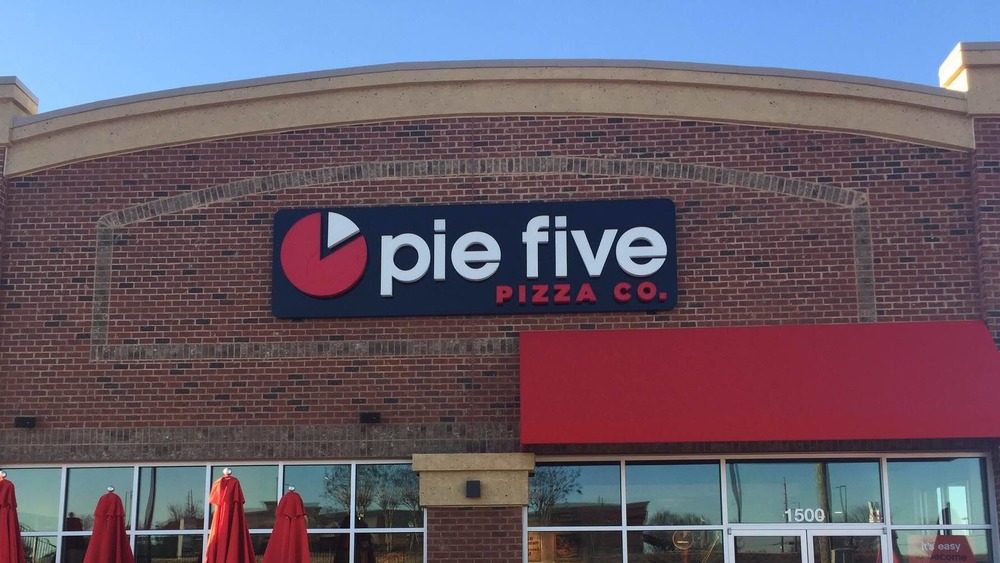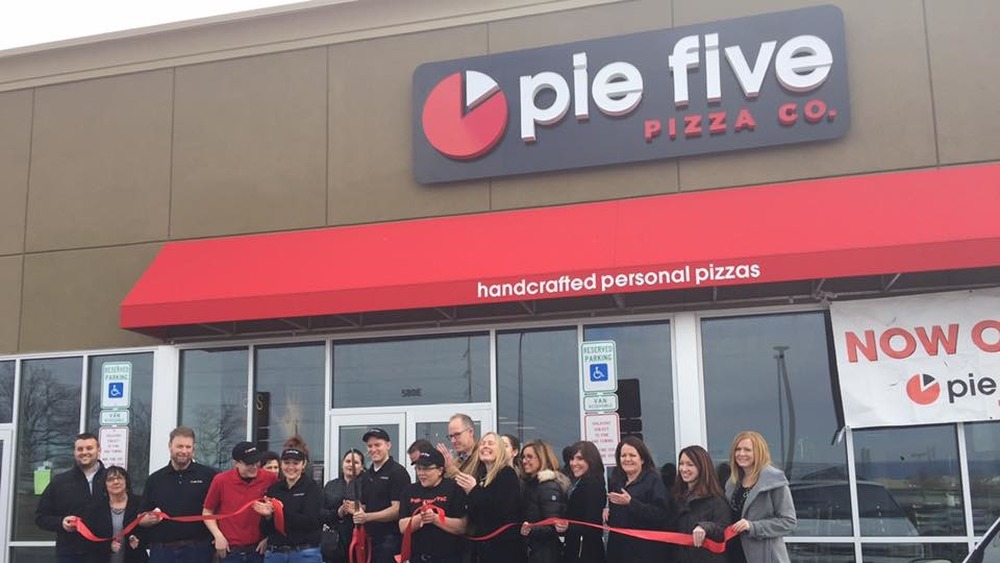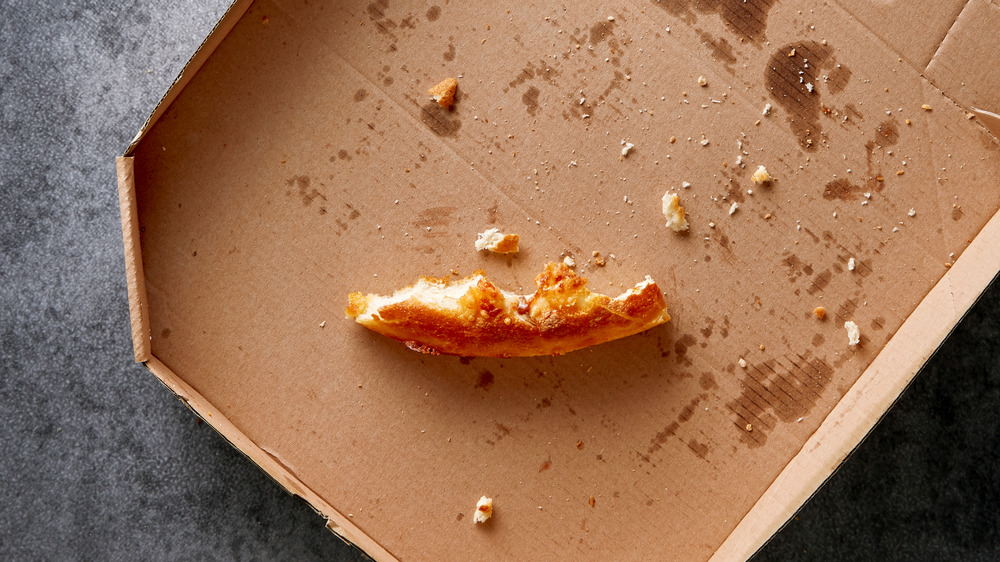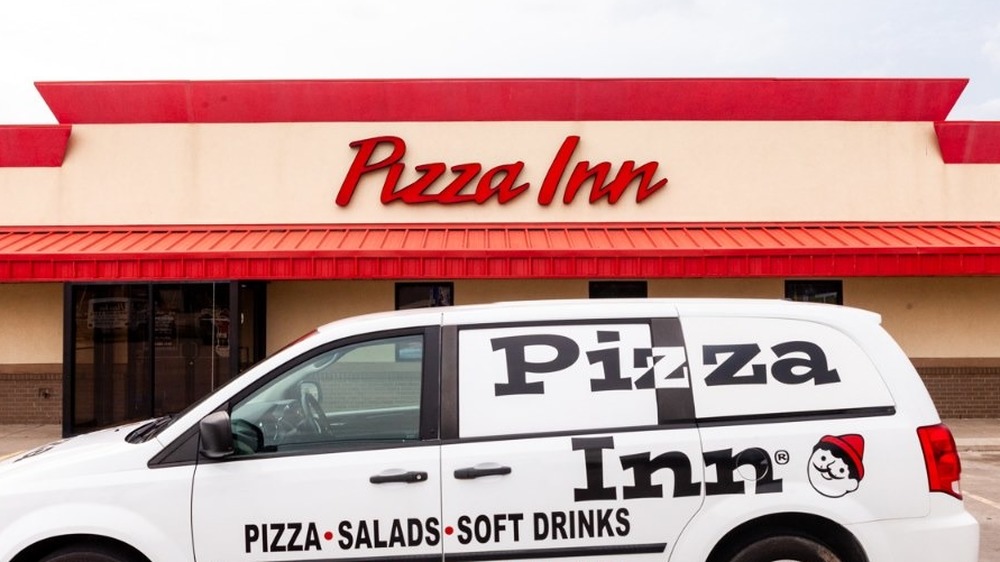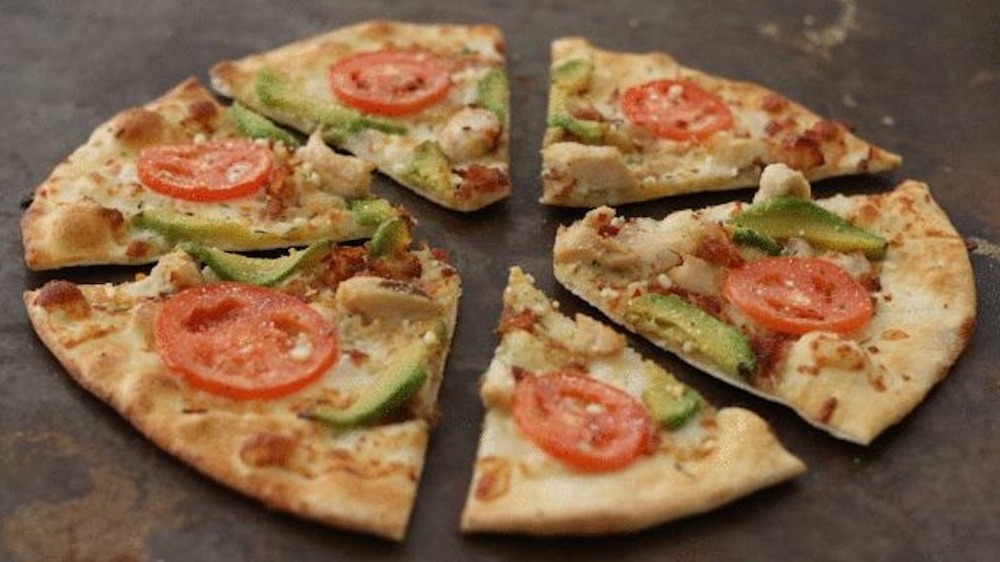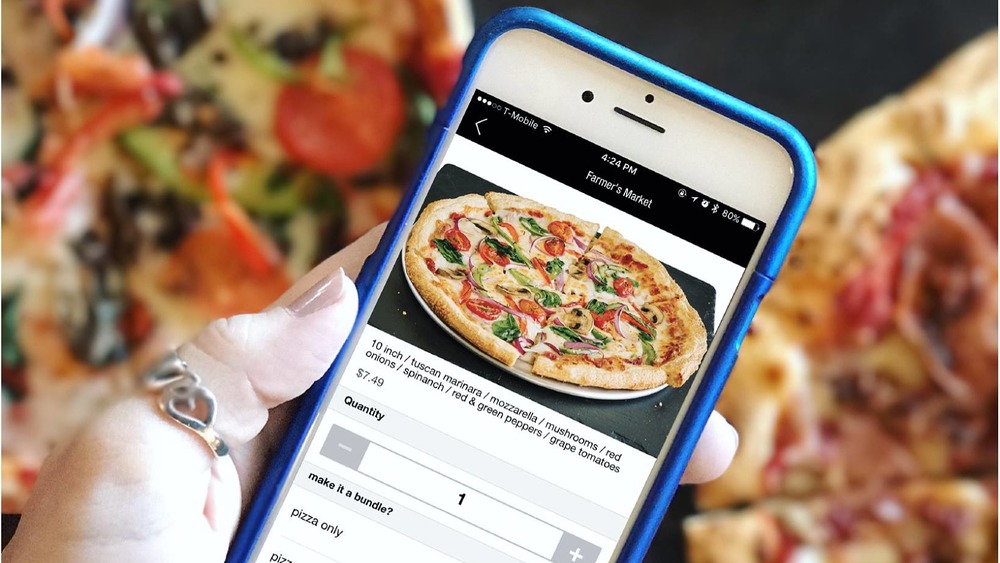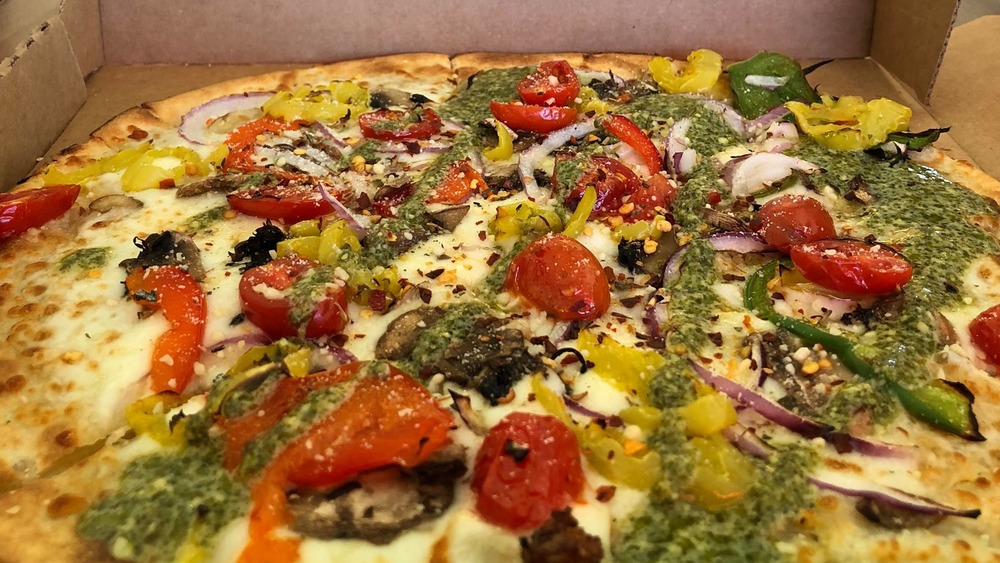Here's Why Pie Five Is Struggling To Stay In Business
Pizza in the morning. Pizza in the evening. Pizza at suppertime. Well, that's sort of the idea behind the concept of fast-casual, dine-in pizza restaurants, anyway. Why pop a DiGiorno in the oven when, for roughly the same price, you could have a totally customized pizza, complete with a bounty of sauces and toppings, ready from scratch to finish in just minutes. Sounds like a revolutionary business model, right? Many think so, too.
As the fast-casual concept has exploded in the last decade largely thanks to its leader Chipotle, so has the niche focus on pizza. According to Eater, pizza makes up nearly 40 percent of the fast-casual restaurant industry. That's a lot of dough, both figuratively and literally. We've seen Blaze Pizza, Pieology, MOD pizza, and of course, Pie Five Pizza spring up to take part in the fast-casual pizza realm.
But as quickly and as brightly as their stars have shined, so, too, have they burned out. Pie Five Pizza, owned by Dallas-based Rave Restaurant Group, once boasted over 100 locations across the United States. The restaurant also landed on numerous lists of acclaim, including Forbes, appearing to have secured its place at the top of the pizza pack. Once dubbed a pioneer of the fast-casual pizza business, the number of restaurants in their portfolio has quickly dwindled down to under 40 locations at the time of publishing, according to their website. Here's why Pie Five is struggling to stay in business.
Pizza is a highly competitive market
It's of no surprise that pizza is a highly competitive market in the already cutthroat restaurant industry, where approximately 60 percent of restaurants fail in their first year (via CNBC). When Tom Monaghan founded Domino's Pizza in the 1960s, he likely didn't know what he was setting in motion. Now, customers expect and even demand the moon and stars from their pizza place. We want fresh, quality ingredients, customized to our liking and served at record speed. On top of that, we expect friendly customer services, complete with a smile, and fair prices to boot. It's easy to forget the little guys as Domino's and Pizza Hut stand firm as the top 2 global pizza chains, but independent pizza places (aka your neighborhood Mom and Pop shop) account for over 40 percent of the nearly 50 billion dollars in sales annually of pizza in the United States.
Why would anyone even attempt to get their piece of the pie in such a fiercely competitive landscape? While mega-chains, like Domino's and Little Caesars, have proved to practice tried and true methods, like the ease of sales due to technology, fast-casual pizza chains are still in their infantile stage and there's no telling if they'll see the same fruitful longevity as its big-time competitors. Nostalgia also plays into this big time, says The Irish Times, with our tendency to reach for familiar and comforting options and less so the newest and trendiest offerings.
Pie Five opened 100 restaurants within 5 years
One of the first fast-casual restaurants, Chipotle, opened in 1993 and has shown little signs of slowing down, Investopedia reports. They successfully created an entirely new sector of the business and now operate over 2,600 locations globally. Quickly-made food in a casual setting didn't become a pizza thing until 2008, however, when Drew French opened the first fast-casual pizza concept, Your Pie (via QSR). French was in college when he saw the potential to adapt the fast-casual concept to another food niche. A trip to Italy, where he undoubtedly consumed copious slices of pizza, sealed the deal.
Many saw the vast opportunity and quickly followed suit on grander scales. Claiming to get pizza served to customers in under five minutes (hence the name) from the time of ordering, Pie Five opened its first location in Fort Worth, Texas in 2011. Growth was slow the first few years and expansion focused mainly on other markets in Texas. Things began to explode market-wise for Pie Five by 2015, says Fast Casual, when the chain opened over 50 more locations as far-reaching as Florida and Maryland. By 2017, they were operating over 100 restaurants and converted to a regional franchise model. Perhaps due to the sudden quick growth and loss of internal control due to the new franchise model, many of these shops closed just as fast as they had opened. Today, according to Scrape Hero, there are only 34 Pie Five locations still in operation.
Fast-casual may not work for Pie Five pizza
Inherently, the fast-casual concept should work perfectly with pizza. With the already prepared dough, there's little skill needed from employees to top and cook the pizzas, resulting in relatively low-cost labor. As Drew French of Your Pie told QSR, the hurdle came in getting the customer accustomed to such speedy service and the vast amount of customization available. This concept certainly goes well beyond your standard large pepperoni for Friday's family pizza night.
While trendy, according to Fool, the fast-casual pizza concept may have been D.O.A. That's thanks to one major and perhaps overlooked component. Already established pizza businesses, like Pizza Hut, Domino's, and even your local Mom and Pop shop, are already serving up your pie hot, fresh, and in a timely fashion. Meanwhile, fast-casual concepts have relied on the fact that their ingredients are reportedly handcrafted and of high quality. Yet, these buzzwords may have been too little, too late in the drive to attract new consumers away from old pizza standbys. On top of all that, it's not exactly convenient for a family to order four specific and unique pizzas, each complete with a laundry list of ingredients. Pie Five attempted to address that hurdle with the addition of 14-inch shareable pizza (via QSR). Regardless, it seems like our emotional attachment to pizza is deep-rooted in our wanting and need to come together to share it, not have it be an individual experience.
Pie Five's sister company, Pizza Inn, has also struggled
While Pie Five is relatively new in the pizza world, its parent company, Rave Restaurant Group, is no amateur when it comes to the business of crust. In 1958, the first Pizza Inn, also operated by Rave, opened in Dallas. The company, known for their pan pizzas served buffet style, at one time operated over 500 storefronts throughout the United States and even internationally (via NBC DFW). Franchising stalled out, however, and the brand's image grew stale. That, along with the sheer amount of real estate needed for new locations, means there are currently just over 150 Pizza Inn locations left. Pizza Inn's then-CEO Charlie Morrison told QSR Magazine: "We lost our way as a company. Opening a few stores and closing a lot is not a recipe for success."
This isn't terribly shocking, as the pizza industry as a whole has had a rough go of things recently, according to QSR. Once the go-to option for the average, hard-working family, the takeout industry is littered with options. Be it diet trends or the growth of other food industries, the crust has gotten a bit stale. Pizza Inn is also faced with the unique challenge of operating a buffet business in a time where eyes are so thoroughly focused on health, cleanliness, and quality, as opposed to quantity. Other all you care to eat concepts, like Golden Corral and Shoney's, have faced steady declines in sales for decades (via Vox).
Pie Five's reviews have been less than stellar
As per The Washington Post, the restaurant industry is notoriously ruthless. Fans certainly aren't willing to hold back if they feel they've been cheated out of their hard-earned money. With economic hardships and crippling debt running rampant, consumers are warier than ever when it comes to which restaurants get their money, fast-casual included. These days, it's common for the would-be consumer to scroll through endless posts, reviews, and comments before landing on a final decision on where they're going to get their grub. While everything should be taken with a grain of salt, most restaurants still operate under the assumption that the customer is always right.
Pie Five has experienced its fair share of negative reviews that may have impacted business. One Pie Five location Lexington, Kentucky has a middling 3.5 stars out of a possible 5 on Yelp. Many complain that the restaurant isn't living up to its promise of fast pizza, with many waiting over 10 minutes for their meal. Pie Five's Independence, MO location is also not immune to bad reviews. Customers have frequently called out the shop for its stingy toppings, dry crust, and lack of cohesive management. While regulars are essential to a booming restaurant business, for the consumer, consistency is key. These mishaps may prevent a future visit from the once loyal customer. According to Restaurant Engine, a whopping 70 percent of customers don't return because of failings like those at Pie Five locations.
Pie Five's marketing campaigns are lackluster
You can lead a horse to water, but you can't make it drink. Or eat pizza, it seems. This is where marketing comes into play in a big way. You can dedicate your life to mastering your craft and creating glorious pizza, but if people don't know about your pizza genius, it may all be for nothing. Therefore, companies spend millions each year carefully designing marketing strategies to capture the public interest. According to FSR, successful companies spend on average 11 percent of their revenue on marketing alone, further proving the theory that sometimes you really do need to spend money to make money. It's not always easy, though. Pie Five's sister company, Pizza Inn, has experienced serious issues with stale branding, according to the Dallas Business Journal.
According to Franchise Chatter, it's up to Pie Five franchisees to undertake marketing. With no set standards, this opens up a whole can of worms if an owner is inexperienced in the complex field of marketing. Budding businesses may be wary of spending their limited funds on marketing, even with potentially positive long-term results. According to marketing expert JC Copy, the Rave Restaurant group has long struggled with its overarching marketing strategies, especially when it comes to email campaigns. They continually fall short in making a strong connection with the consumers. Unfortunately, their email blasts are perceived simply as mass, self-serving advertisements that do little to draw in the customer through establishing a genuine connection.
Craft beer and cauliflower can't save Pie Five
Diet trends may be to blame for the overall downhill sales that the pizza industry has experienced. There has been perhaps no bigger diet than the low-carb trend. From Atkins to Keto, this has become a serious money-making sector of the food industry (via The Rail). Restaurants have been quick to adapt to these new demands of their customers and their waistlines. Pie Five jumped on board the low carb train with the debut of a cauliflower pizza crust that is lower in carbohydrates, sodium, and sugar in comparison to its carby predecessor. What started as a limited-time run quickly became a permanent menu item thanks to demand. According to Forbes, traffic into Pie Five saw a resurgence as a direct relation to the new menu item, but it's likely not strong enough to pull the company out of its economic hardship.
One franchise owner took matters into their own hands in an attempt to draw in new clientele and increase sales. Located in the suburbs of Kansas City, Pie Five's Westport location in Kansas City sunk a lot of dough into expanding their craft beer selection and offering a patio dining spot. According to the Kansas City Business Journal, the attempt to appeal to the sports bar type failed to result in additional foot traffic as locals opted to visit full-service bars as opposed to the pizza chain. Within a year of the reinvestment, sadly, that location closed.
Coronavirus impacted an already struggling Pie Five
The Rave Restaurant group was already struggling before it came head-to-head with the 2020 global coronavirus pandemic. Few businesses were spared as the virus decimated the restaurant industry and forced many out of work. Some especially hard-hit restaurants were even forced to close. From March to June 2020 alone, the National Restaurant Association has estimated that the restaurant industry lost a whopping $120 billion with millions of employees out of work. With the state-mandated at-home orders, restaurants have pivoted to unconventional ways of generating revenue streams but even that has also proven to be of little profit. Given the astonishing overhead needed for a restaurant to run properly, it's difficult to survive on take-out orders alone.
Pie Five and its sister restaurant, Pizza Inn, were also not spared from the economic hardship. The fallout was palpable as, according to Restaurant Business, the first quarter of 2020 saw the company's 18th consecutive quarter of a decline in sales. That first quarter also saw the company close an additional 10 stores in the Pie Five brand. Similarly, Pizza Inn also saw the unprecedented challenge of operating a buffet-style restaurant in a time of increasingly stringent safety and health protocols. With the global pandemic still lingering worldwide and mandates still in place in many locations, it's not clear how much longer the Rave Restaurant Group can hold on.
Pie Five is at risk of dropping off the Nasdaq listings
The impact of the 2020 COVID-19 pandemic has proven to be yet another devastating blow for the Rave Restaurant group. Plagued with an endless decline in sales and near-constant closings of its locations across the country, the struggling restaurant company now faces the financial indignity of its removal from the Nasdaq stock market listings, as Restaurant Business reports. This is the second time in just 6 months that the company has received such a delisting warning, making its struggles plain for all to see.
As per Restaurant Business, the Securities and Exchange Commission requires that a company must maintain the minimum of $1 per share. While it wavered just above this minimum in 2020, as of January 2021, it's being traded at just 90 cents a share. According to The Nest, when a company is delisted, that usually means major trouble is ahead and that the struggling business has little chance of rebounding. Now, investors in Pie Five are faced with the slim chances of ever seeing a return on their investment. Rave Restaurant Group has currently appealed the delisting notice, leaving the future of their stock is still up in the air.
Pie Five suffered a credit card security breach
Maintaining customer loyalty is a crucial challenge for any restaurant. Between inconsistent food quality and less than pleasant customer service at some Pie Five locations, keeping the customer satisfied is at the forefront of many franchise owners' minds. At least, it should be if they want to stay in business. Ultimately, that customer-restaurant relationship all comes down to trust. When trust between a customer and restaurant is broken, it's hard and sometimes downright impossible for a business to gain it back. Pie Five experienced a major breach of trust when, in 2018, customers' credit card security was compromised.
After an extensive investigation, Pie Five came to the conclusion that a cybercriminal was able to gain access to their software and installed a capturing system that went undetected, according to a 2019 press release from the company. This high-level system was able to capture sensitive payment information from customers who used their debit and credit cards for purchases at store locations. Pie Five sought out law enforcement and went on to improve their operating software systems, but the damage was done. In Topeka, Kansas, WIBW reported another such credit card incident for Pie Five. In this instance, the pizza chain's payments on purchases were delayed in some cases for months at a time. Breaches of credit card information are nothing new in this digital age, as TODAY reports, but even one such incident can quickly turn even the most loyal customer sour.
